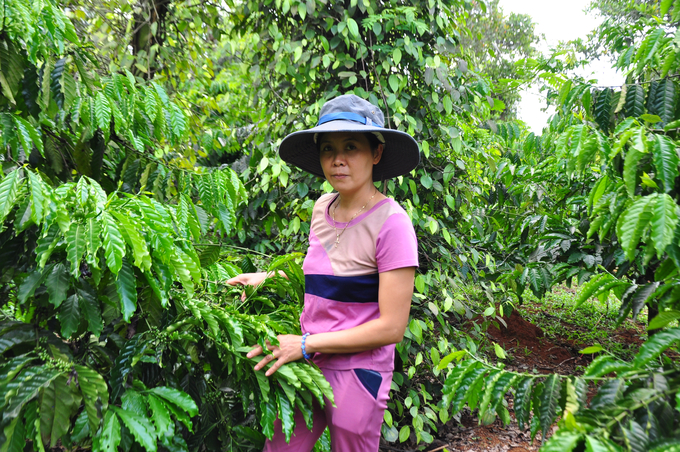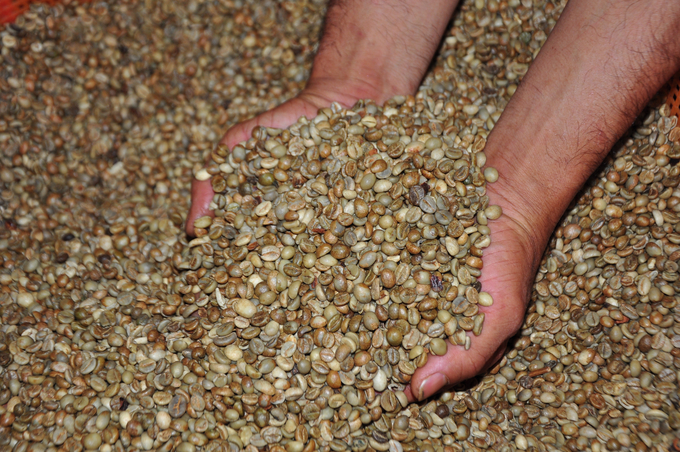June 16, 2025 | 23:38 GMT +7
June 16, 2025 | 23:38 GMT +7
Hotline: 0913.378.918
June 16, 2025 | 23:38 GMT +7
Hotline: 0913.378.918

Deputy Minister Le Quoc Doanh said that the success of the project would open up a lot of new opportunities in the context that the Ministry of Agriculture and Rural Development has a new strategy that emphasizes green agriculture and effective agriculture in response to climate change.
On October 12, the Ministry of Agriculture and Rural Development (MARD), in collaboration with the Food and Agriculture Organization of the United Nations (FAO) and the World Bank (WB), held a conference to review the completion of the "Vietnam - Sustainable Agriculture Transformation (VnSAT)” Project in Da Nang City.
Having been implemented in 13 provinces of Vietnam from 2015 to 2022, the Project has made an important contribution to the implementation of the Agricultural Restructuring Scheme shown through improving the institutional capacity of the agricultural sector, innovating farming methods towards sustainability, and enhancing the value chain for the rice and coffee industries.
The positive impacts of this project are not only observed through the improvement of the productivity and quality of rice and coffee but also through the environment and society. The localities funded by the project all admit that the models that VnSAT has deployed in the area have brought success as expected.

Dak Nong has built landscape coffee gardens, aiming to form high-value specialty coffee gardens.
According to Vice Chairman of Hau Giang People's Committee Truong Canh Tuyen, the project’s relentless technical support helps raise people's awareness in the province. To give some examples, the amount of seed sown has been reduced from 180-200 kg/ha to only 80-100 kg/ha now, saving a lot of input costs while increasing profits and protecting the environment. “The first 9 months of 2022 recorded a growth rate of 3.68%. This is the result of the VnSAT Project, which leads to the development of production in Hau Giang province.”
In the case of Dak Nong province, the VnSAT Project focuses on the coffee industry. Vice Chairman of Dak Nong People's Committee Le Trong Yen said that the VnSAT Project had supported many localities in the province to replant low-efficient coffee gardens. Up to now, 22,000 ha of coffee in Dak Nong has been successfully replanted, showing outstanding yield.

If the average yield of coffee in Dak Nong in 2015 was only approximately 2.2 tons/ha, it has now increased to over 3 tons/ha.
“We of Dak Nong province highly appreciate the efforts of Deputy Minister Le Quoc Doanh as well as the management of the Agricultural Project Management Central Board and related units. We ask that the Ministry of Agriculture and Rural Development together with central ministries, agencies, and donors continue to support not only the coffee industry but other key products in the Central Highlands as well, such as pepper," said the Vice Chairman of Dak Nong People's Committee.
Deputy Minister of Agriculture and Rural Development Le Quoc Doanh said that the success of the VnSAT Project was made possible thanks to choosing the right time for implementation as well as focusing on two important goods sectors which are rice and coffee. Besides, the project was designed very methodically, scientifically and logically right from the beginning. The units participating in the project were capable and operate effectively.
“We have chosen techniques that directly affect the production efficiency of these two categories. Actually they are not that high-level, just something very close to farmers like 3 decrease, 3 increase (3T3G) or 1 must 5 decrease (1P5G) coupled with basic and methodical implementation. In addition, the organization of production and support are strengthened in a synchronous manner. The value of the project will not disappear when the project ends but instead continue to exist," said Deputy Minister Le Quoc Doanh.

The success of the VnSAT Project greatly contributes to the development of the rice and coffee industries in particular and Vietnam’s agriculture in general.
Dina Umali-Deininger, Agriculture and Food Practice Manager for the East Asia and Pacific Region, World Bank, said, “The VnSAT Project not only improves farming efficiency, increases farmers' incomes, and reduces environmental pollution but also contributes to the reduction of greenhouse gas emissions in agriculture. This successful model can be a ‘springboard’ to replicate in other regions across Vietnam since the Ministry of Agriculture and Rural Development is implementing green agricultural transformation in the country.
Translated by Samuel Pham
![Turning wind and rain into action: [4] Bringing climate bulletins to remote and isolated areas](https://t.ex-cdn.com/nongnghiepmoitruong.vn/608w/files/linhnhp/2025/06/14/1152-z6704423696987_15fd32ffc26d590d204d520c9dac6786-nongnghiep-151141.jpg)
(VAN) The Vietnam Agriculture and Nature Newspaper interviewed Mr. Vu Thai Truong, Acting Head of Climate Change and Environment at UNDP Vietnam, to gain deeper insight into how climate bulletins are delivered to farmers.

(VAN) In Tien Giang, a high-tech shrimp farm has developed a distinctive energy-saving farming model that has yielded promising results.
![Turning wind and rain into action: [3] 300.000 farmers benefit from agro-climatic bulletins](https://t.ex-cdn.com/nongnghiepmoitruong.vn/608w/files/news/2025/06/12/e5a48259d6a262fc3bb3-nongnghiep-125122.jpg)
(VAN) The agro-climatic bulletin has become a valuable tool for farmers in the Mekong Delta. After more than five years of implementation, the initiative is gradually being expanded nationwide.
![Turning wind and rain into action: [2] Providing forecasts to the people](https://t.ex-cdn.com/nongnghiepmoitruong.vn/608w/files/news/2025/06/12/e5a48259d6a262fc3bb3-nongnghiep-103927.jpg)
(VAN) In addition to improving the quality of hydrometeorological forecasts, putting forecast bulletins into practical use is crucial for production and disaster prevention.

(VAN) Blue carbon is receiving attention for its rapid absorption capacity and vast potential. It represents a promising nature-based solution to respond to climate change.
/2025/06/11/3507-1-161904_583.jpg)
(VAN) Seagrass beds and coral reefs serve as 'cradles' that nurture life in the ocean depths, creating rich aquatic resources in Vietnamese waters.
![Turning wind and rain into action: [1] Forecasting for farmers](https://t.ex-cdn.com/nongnghiepmoitruong.vn/608w/files/news/2025/06/11/e5a48259d6a262fc3bb3-nongnghiep-111919.jpg)
(VAN) Weather is no longer just a matter of fate. Forecasts have now become an essential companion for farmers in every crop season.